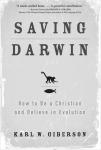Karl Giberson is a prominent figure in the modern dialog between science and religion. He is a professor of physics at Eastern Nazarene College and the director of the Forum on Faith and Science at Gordon College. Giberson was also the founding editor of Science and Theology News and the editor-in-chief of Science and Spirit. His recent book Saving Darwin will enjoy a wide readership, and it will certainly challenge many, raising important questions about how science and Christianity are to be related. The book features a lively and witty writing style, and in particular, it is very personal. A lasting image I have is of Giberson telling his story of leaving home to attend college and bringing along his copies of Henry Morris’s The Genesis Flood and Many Infallible Proofs. I can relate completely with his "teenage fundamentalist" (p 3) phase of life, because I have traveled a nearly identical route (I offer my personal story in Lamoureux 2008: 332–66).

One of the best parts of the book is a summary of the history of the "Darwin wars" in America. Numerous longer and more detailed accounts exist of these encounters, but Giberson offers an accessible distillation of the 1925 Scopes "monkey" trial, the 1981 Arkansas trial challenging a law calling for equal treatment of evolution and creation science in schools, and the recent Dover trial dealing with the teaching of "intelligent design". The book is also a historical examination of Darwin’s personal religious beliefs, revealing without any question that the famed naturalist wrestled mightily with the theological implications of his theory of evolution. Giberson correctly points out that the vicious character of nature (as seen with the Ichneumonidae) and personal tragedies (like the death of his beloved ten-year-old daughter Annie) were powerful factors leading Darwin away from theism and Christianity. However, and this is a minor quibble, Giberson understates the spiritual impact of nature upon Darwin. The "wondrous universe" and "wonderful contrivances for certain purposes in nature" led Darwin to fluctuate from his agnosticism late in life back to deistic, and maybe even theistic, moments (Barlow 1958: 92–3; Darwin 1888: 1: 304, 316).
In order to assist his Christian readers in coming to terms with evolution, Giberson offers an excellent description of evolution’s metaphysical status. He writes:
Biological evolution, in its pure form at least, is purely descriptive. It tells us, as best it can, what happened, like a video of an event. It does not pass judgment on whether the history it describes was good or bad, just as a video passes no judgment on the event it captures. (p 64)
In addition, throughout the book, Giberson respectfully decouples evolutionary theory from the dysteleological metaphysics and personal philosophical commitments of Carl Sagan, EO Wilson, Daniel Dennett, Richard Dawkins, and other like-minded skeptics. As far as I am concerned, this categorical differentiation is absolutely essential in moving beyond the so-called evolution versus creationism debate. Evolution is a magnificent and fruitful scientific paradigm, but it is dead silent with regard to its metaphysical status, and caution is necessary to avoid conflating one’s personal beliefs, whether religious or antireligious, with this scientific theory.
As much as I enjoyed Giberson’s book, I do have one serious concern. The subtitle, "How to be a Christian and Believe in Evolution," is regrettably inaccurate (it was the publisher’s subtitle, not that of the author). Let’s be frank: the anti-evolutionism in America is rooted in evangelical Christianity, and if anyone is going to assist this religious tradition (which by the way is my tradition; I’m a Baptist), then he or she must deal directly with the opening chapters of the Bible. Giberson points to a survey that reveals "over half the population of the United States accepts the biblical creation story," and then attempts to deal with this problem by stating that "this position is thoroughly at odds with almost all relevant scholarship of the past century" (p 6, his emphasis). An argument from authority will never be effective with evangelicals. In the study cited by Giberson, it was shown that 87% of evangelicals believe that the accounts of a six-day creation and Noah’s flood are "literally true, meaning it happened that way word-for-word." Solving the problem of anti-evolutionism in the nation requires dealing with the evangelical belief in concordism, the notion that the Bible reveals accurate scientific and historical facts in its opening chapters. And Giberson falls quite short on this issue. I doubt that many full-blooded, Bible-verse–memorizing, and Gospel-witnessing evangelicals will step away from their anti-evolutionism after reading Saving Darwin.
But Giberson’s book is an important one. Its personal story is courageous and honest. As a Christian, he is even willing to confess, "[M]y belief in God is tinged with doubts, and in my more reflective moments, I sometimes wonder if I am perhaps simply continuing along the trajectory of a childhood faith that should be abandoned" (p 155). Yet, as a physicist, Giberson is drawn back to faith by the universe. In a section entitled "A Brief History of Everything," he outlines surprising characteristics in cosmological evolution, and seven times he states that there is something remarkably "interesting" about these that eventually leads him to believe that "the universe is more than particles and their interactions" (p 220). And in his yearly pilgrimage to the Canadian wilderness, Giberson feels the spiritual impact of nature upon him. He asks, "If the evolution of our species was driven entirely by survival considerations, then where did we get our rich sense of natural aesthetics?" (p 209). Indeed, in many ways, Karl Giberson is Charles Darwin. Both are scientists grappling with faith and in awe of the "endless forms most beautiful and most wonderful [that] have been, and are being, evolved." (Darwin 1964: 490).
